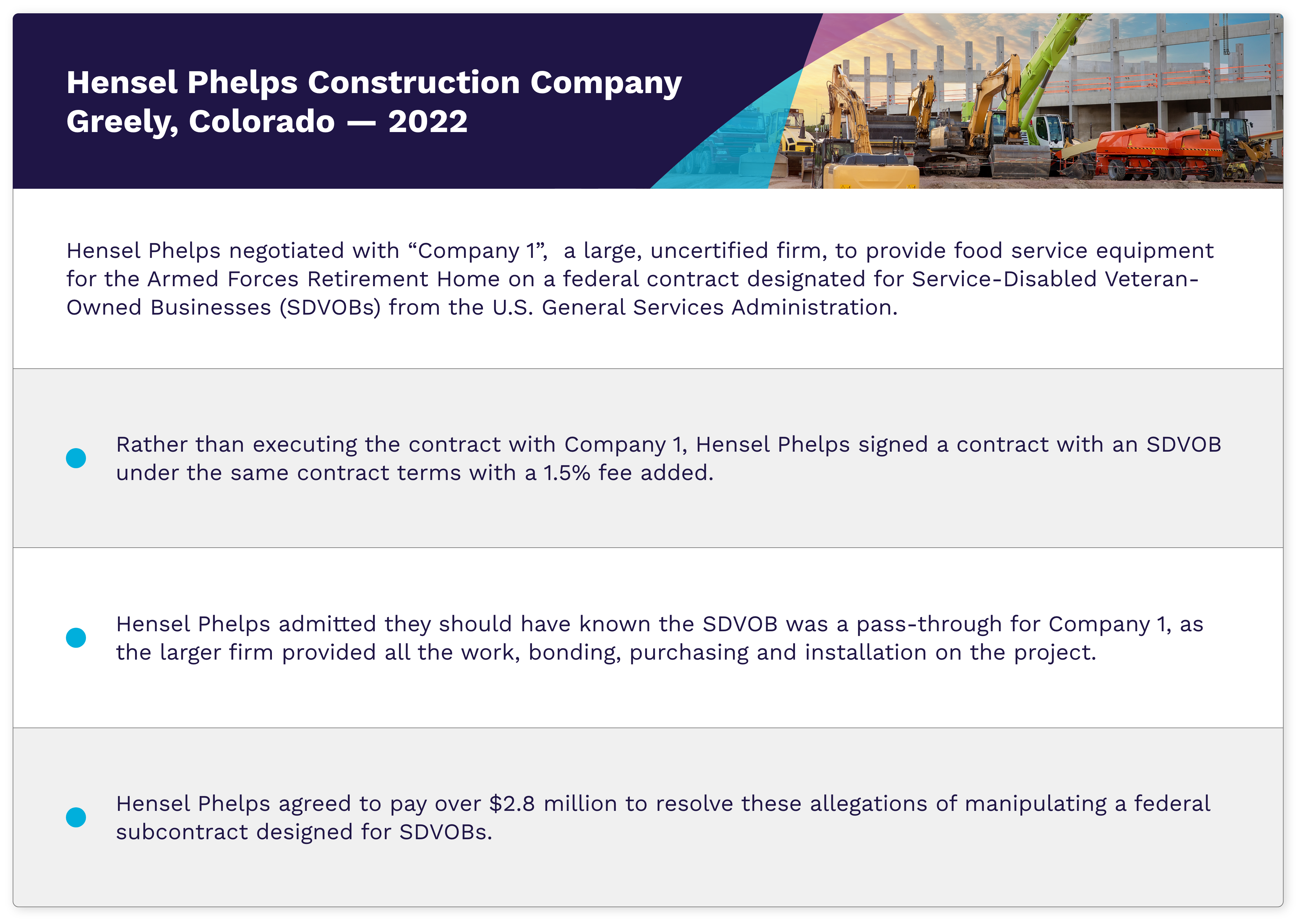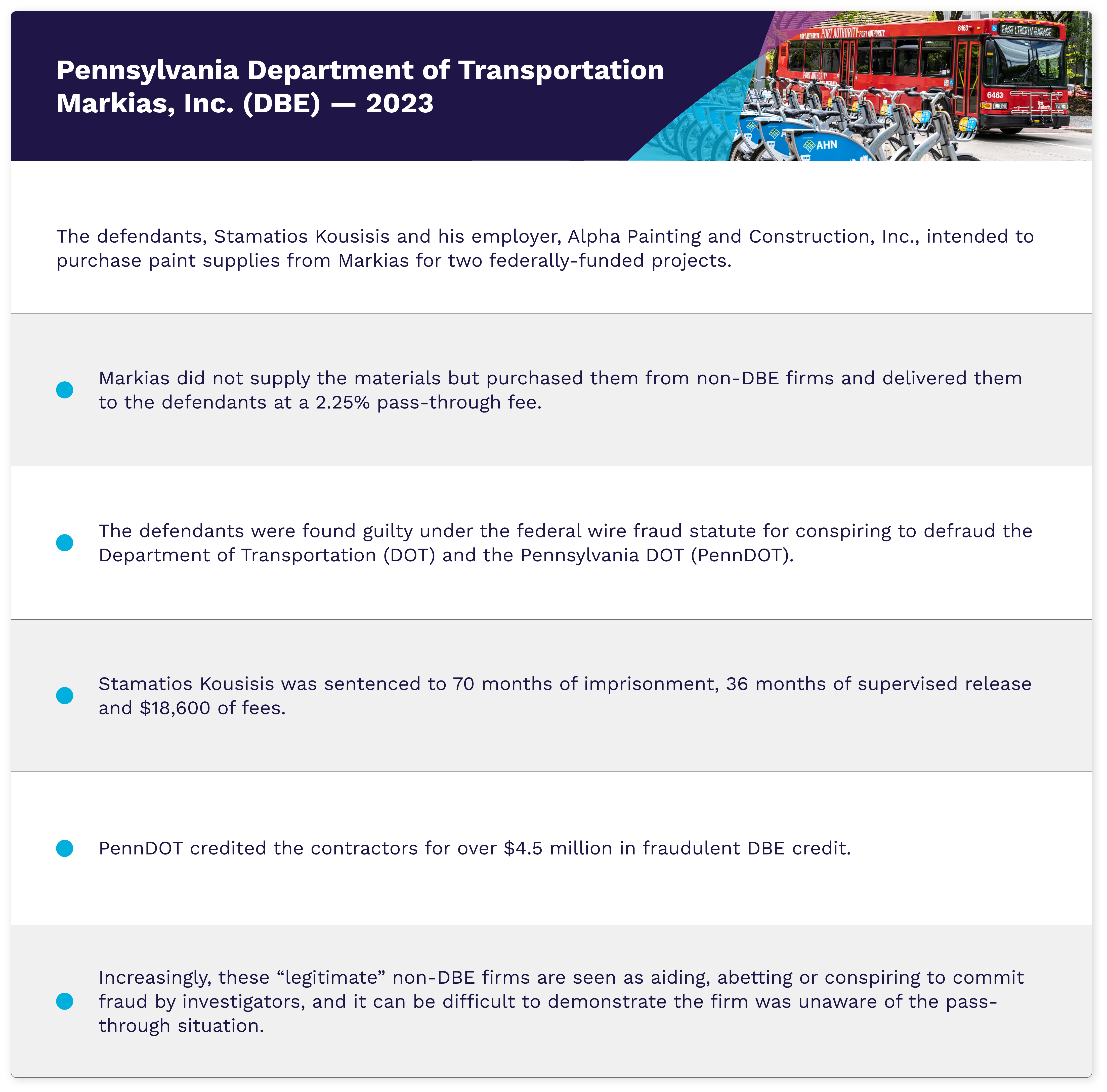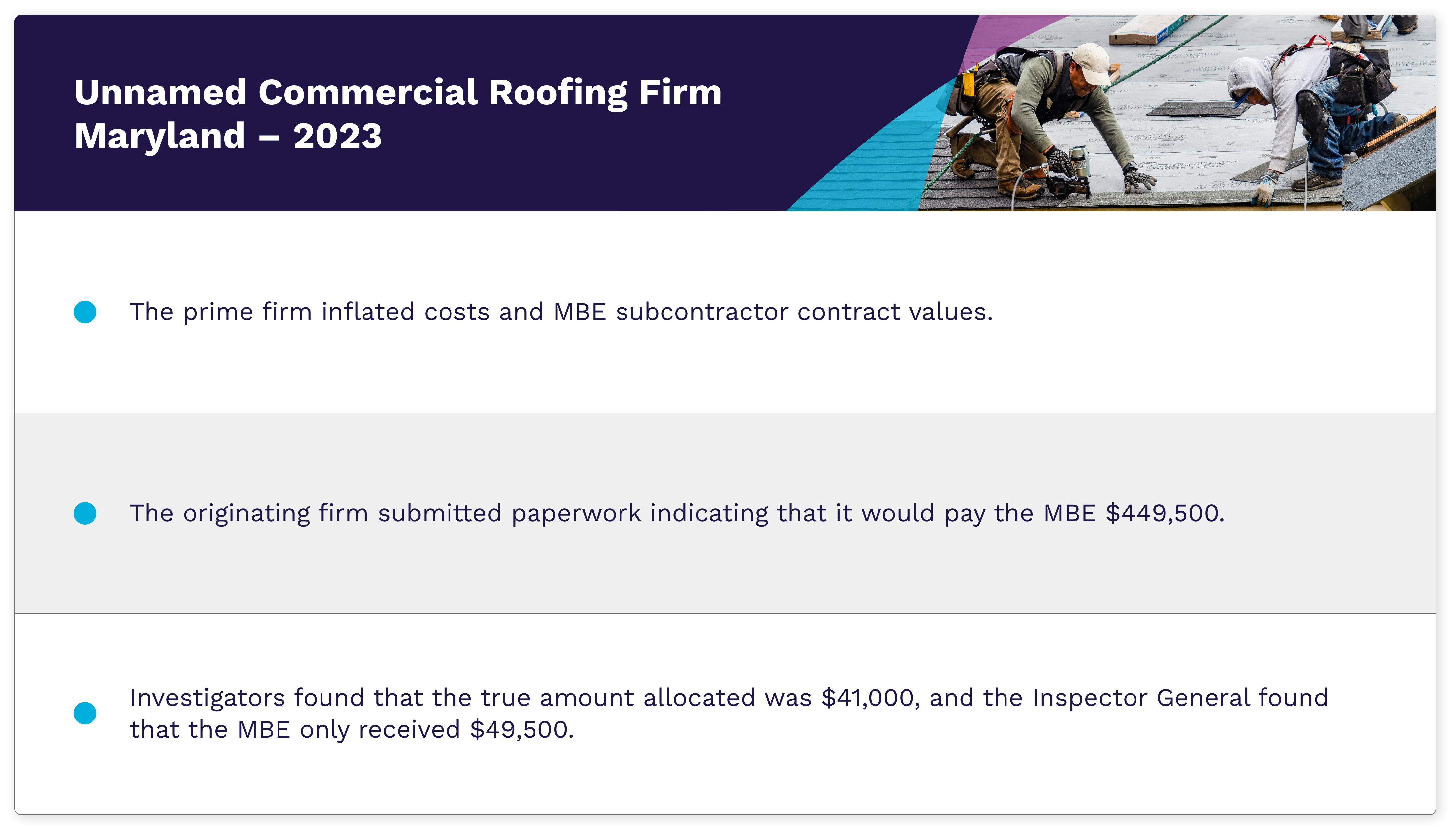Articles & Alerts
MWBE Fraud in State-Funded Projects: How to Protect Your Business and Reputation
Environmental, Social, and Governance (ESG) principles have become a greater focus of government. New York State has recognized this and has introduced regulations that require the use of Minority- and Women-Owned Business Enterprises (MWBEs) for state-funded contracts. Organizations looking to undertake a state-funded construction project over $100,000 or consultant contracts over $25,000 must ensure they are in compliance with the MWBE utilization rules, which are governed under Executive Law Article 15-A.
In 2022, Governor Kathy Hochul signed legislation to create a fund to audit and investigate misconduct in the NYS MWBE program. The legislation also increased fines for fraud. A report conducted in 2014 determined that “more than $10 million intended for honest MWBEs had instead gone to fraudulent non-MWBEs, cheating legitimate MWBEs out of contracts.” This included a high-profile case involving a steel contractor on the World Trade Center site.
The creation of the fund has led to an active investigation into MWBE fraud. The cost of non-compliance to an originating firm or organization is high, with potential criminal charges and lofty fines. There is also a high reputational risk associated with these cases. All of these potential consequences can be avoided through proper auditing and compliance procedures from a reliable third-party firm with experience in these matters.
Originating firms often have no idea that fraud is occurring; it is usually subcontractors who engage in various schemes to get around MWBE utilization rules. Compliance requires MWBE organizations to perform a Commercially Useful Function (CUF). CUF refers to the various requirements of contractors to meet MWBE utilization rules on a government-funded contract.
NYS MWBE programs and their objectives
The goal of MWBE programs is to promote economic equality opportunities for marginalized communities and businesses. The NYS Division of Minority and Women’s Business Development (DMWBD) is the body responsible for overseeing certifications of MWBEs and ensuring that contracts are in compliance with the utilization program. It was created in 1988 through Executive Law Article 15-A. Thanks to various initiatives and robust support from lawmakers, the MWBE utilization rate in New York State is the highest in the nation.
In 2016, the state conducted a study which found there was significant economic disparity for underrepresented groups. The study contained a number of recommendations to reduce this disparity and goals to be implemented for MWBE firms. The study’s recommendations led to legislation being signed in 2019, which reauthorized the MWBE program until 2024 and introduced the Workforce Diversity Program, which is the core of our focus. This program introduced the MWBE utilization rules for state-funded contracts, and incorporated reporting requirements for contractors operating under those contracts. These utilization rules do not provide grants or other monetary incentives for hiring MWBE firms; they simply require that MWBE suppliers and contractors be used on all state-funded contracts. Most MWBE fraud occurs as a result of subcontractors trying to get around these requirements.
In the 2020-2021 fiscal year, the state surpassed its goal of 30% MWBE utilization, showing that the legislation, which stemmed from the 2016 study, had worked. The program shows no signs of being wound down in 2024; if anything, lawmakers plan to expand it.
Similar Fraud Case

NYS MWBE Programs: Qualifications and Certification
To participate in the Workforce Diversity Program and be eligible as an MWBE firm for state-funded contracts, an MWBE must be certified by the DMWDB. While this process is free, it can be tedious. It currently takes approximately a year to become certified, but changes may be coming to the program which will reduce the timeline to 12 weeks.
In order to qualify for this certification, a firm must be 51% owned, operated, and controlled by citizens and permanent residents who are women or fit specific ethnic definitions. Since some types of MWBE fraud, such as fronts, are typically not perpetrated by certified MWBE suppliers, one of the most effective risk mitigation techniques is to ensure that valid MWBE suppliers and/or contractors are being hired in the first place. There are also specific rules for MWBE firms in terms of supplier relationships and the composition of their workforce.
MWBE Suppliers
- Certified suppliers must sell materials from their own inventory out of a warehouse or other facility.
- They cannot fulfill an order from a third-party supplier unless there is some supplier relationship. For example, they cannot purchase supplies from a common retailer (e.g. Home Depot) and pass them along to the prime contractor.
Distinction between suppliers and distributors
- Distributors sell goods to the final customer, but are not the manufacturer of the product, often working as a mediator between the supplier and the manufacturer.
- Suppliers sell goods to other businesses that will sell to the end customer. Suppliers work directly with manufacturers or sometimes do the manufacturing themselves.
MWBE Workforce
- A subcontracted firm cannot “share” employees with another contractor.
- It’s a red flag if the work personnel are normally employed by another business, or the work is jointly completed with another contractor.
Types of MWBE Fraud
The three types of MWBE fraud we typically see — both in our audits and in the news — are pass-through fraud, supply schemes, and fronts.
- Pass-through: A pass-through is a fraud scheme where the originating firm subcontracts with an MWBE, but a non-MWBE firm performs the work. The MWBE pays the sub-subcontractor for the work and receives a fee from the originating firm.
- Supply Schemes: In a supply scheme, an MWBE acts as a conduit between a non-MWBE vendor and the originating contractor for a fee but does not contribute anything to the project.
- Fronts: In a front, a non-MWBE contractor operates or controls an MWBE firm. The MWBE does the work while the non-certified firm decides which work to pursue, negotiates, provides equipment, and supervises employees.
Reasons for MWBE Fraud
Why would a contractor conduct this kind of fraud when they know the risk? The answer is simple: money. They want to do the work themselves and don’t want to subcontract an MWBE for a portion of their job. Where the answer isn’t money, it is usually relationships. They may have trusted subcontractors and consider the risk of being caught in a CUF violation equal to that of taking on a new contractor they do not know.
The following case study illustrates how MWBE fraud can be conducted by the use of a supplier pass-through.
Disadvantaged Business Enterprise (DBE) Fraud Case

Commercially Useful Function: The standards that must be met by the prime contractor
Commercially Useful Function is a term used for the bucket of requirements that must be met by a prime contractor on a government contract to receive credit towards MWBE utilization goals. Put simply, they must “perform a useful role proportionate to the payment received for their work on a state contract.” In New York State, a state-funded construction contract with a value of at least $100,000 will be assessed for MWBE goals and held to the CUF standard.
The originating firm is responsible for monitoring and reporting on CUF. This is where liability comes in – the firm which is responsible for the overall execution of the project is also responsible for making sure all work is compliant with CUF requirements. Not knowing that a subcontractor is skirting the rules is not a sufficient excuse. This is why it is necessary to employ rigorous auditing services.
For the CUF standard to be met:
- An MWBE is responsible for the performance, management, and execution of the work.
- MWBE credit may be removed by the state or other government agency if CUF is not met upon their review.
- The amount paid under the contract must be proportionate to the work and effort that is performed by the MWBE.
- The MWBE cannot act as a pass-through.
- The firm should be certified in the relevant NAICS or commodity codes for the work they are performing. North American Industry Classification System (NAICS) is a standard used by federal agencies to classify businesses in the U.S. economy.
- If an MWBE subcontractor uses a third-tier subcontractor, utilization credit is only given if this third firm is also certified.
CUF should be evaluated on a contract-by-contract basis by the project management team, and ideally audited by a third-party firm for the best outcome.
MBE Fraud Case

Anchin: Your resource in MWBE fraud prevention
At Anchin, we proactively help firms avoid the penalties and reputational risk of MWBE fraud on a daily basis. Our Regulatory Compliance and Investigations (RCI) team are the people you will be working with, and they are led by Brian Sanvidge — former Inspector General for New York State, with ten of those years being spent with the Department of Labor. Brian and his team are familiar with all corporate and construction regulatory requirements and fraud schemes.
Our services include:
- Verifying MWBEs are certified with the state
- Physical, regular inspection of job sites and/or offices
- Sourcing and hiring MWBEs for projects
- Identifying patterns that could signify common MWBE fraud methods, including pass-through supplier fraud, through monitoring of commercially useful function
- Helping preferred suppliers obtain MWBE certification where they are eligible
Your ROI is directly reflected in the time you save internally conducting audits and reporting, but we bring so much more to the table than that. We recognize fraud-indicating patterns that your internal teams may not, which gives your management and board the peace of mind that your business and reputation will not be impacted by MWBE fraud. A state-funded contract should be something your firm is proud to complete and have in its portfolio, not a source of reputational damage.
Lawmakers have indicated that the program will be renewed and made even more rigorous in 2024. If your firm is planning on bidding on any state contracts in the near future, or you have won a contract and want guidance, contact Brian Sanvidge, Principal & Leader, RCI Group, or your Anchin Relationship Partner.
